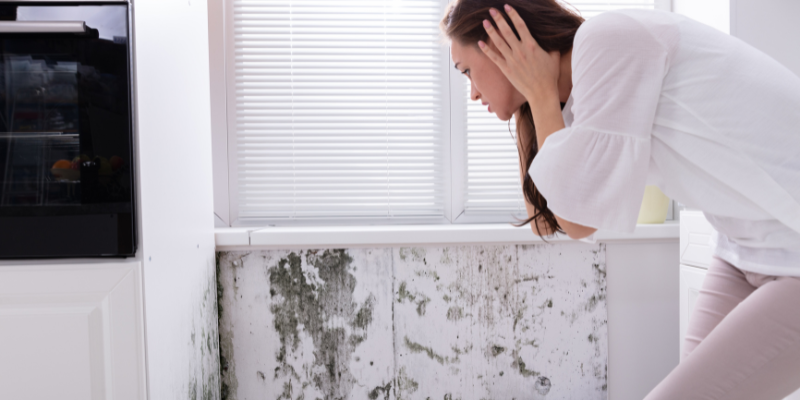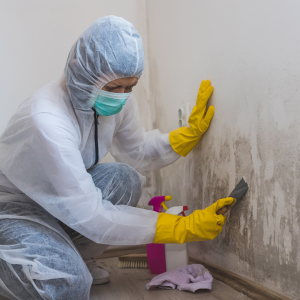
Are you facing the challenge of selling a property with mold in Massachusetts? Don’t panic! It’s a situation that thousands of Massachusetts homeowners successfully go through every year.
Mold might seem like a deal-breaker, but with the right strategies, you can still achieve a successful sale. This guide will cover all the essential information you need to make informed decisions when selling, so keep reading until the end!
What is Mold and Why It’s a Concern for Home Sellers
Mold is a type of fungus that thrives in damp environments. It reproduces by releasing tiny spores that float through the air. They can establish new colonies when they land on suitable surfaces.
You’ll commonly find mold in bathrooms, basements, attics, and around windows. Basically, anywhere moisture tends to accumulate.
For home sellers in Massachusetts, mold can be problematic. First, they don’t look nice. Those black or greenish patches on walls and ceilings can immediately turn off potential buyers during showings.
More importantly, mold can cause health issues that make buyers nervous. Some people experience allergic reactions or respiratory issues when exposed to mold. Certain varieties (like the infamous black mold) can cause more serious health concerns.
Common Types of Household Mold

Learning about the type of mold you’re dealing with can help you make better decisions about remediation. Here are the most common types you might encounter in your Massachusetts home:
• Aspergillus: This appears as gray-green or black spots and is commonly found on foods and in air conditioning systems. Though generally not the most dangerous variety, it can cause respiratory infections in people with weakened immune systems.
• Cladosporium: This type of mold looks olive-green to brown and often grows on fabric, wood, and other damp, porous materials. This can trigger allergic reactions and asthma attacks in sensitive individuals.
• Penicillium: This typically appears blue or green and has a fuzzy texture. You’ll often find it on water-damaged materials like carpets, wallpaper, and insulation. While penicillium gave us the first antibiotic, some species can produce toxins that cause allergic reactions.
• Stachybotrys chartarum (black mold): This is the variety that causes the most concern. It appears dark green or black with a slimy texture. This can produce potent mycotoxins that may cause serious health problems.
Massachusetts Regulations on Mold in Real Estate
Massachusetts doesn’t have specific mold laws, but don’t think you’re off the hook! Your legal obligations come from general real estate laws and the Consumer Protection Act.
Hiding mold problems could cause you triple damages and attorney’s fees. The courts don’t mess around when it comes to sellers who hide property defects.
You need to include any mold issues on your seller’s disclosure form. No specific “mold box” to check? It doesn’t matter! When the form asks about water or moisture problems, that’s your cue to mention past or present mold situations.
Landlords face tougher standards than regular homeowners. If you’re selling a rental with mold, you can’t just ignore tenant complaints while trying to close the deal.
Your tenants might legally withhold rent if you don’t address serious mold problems.
Also, your legal exposure doesn’t magically disappear when you surrender the keys. Buyers have years to discover problems and come knocking on your door with lawsuits.
So, how do you avoid this? Transparency and documentation of everything mold-related.
Identifying Mold Problems in Your Home
Before you can deal with mold, you need to find all its hiding spots.
Mold loves playing hide-and-seek in your home. Check the usual suspects first. This includes the bathrooms, basements, and that sketchy corner in your attic.
Don’t forget to look behind furniture and inside closets where air circulation is poor.
Your basement is practically a mold hideout because of its dampness, cool temperatures, and poor ventilation. Bathrooms come in second place because all that steamy shower creates mold!
If you can’t see mold but smell something funky? Trust your nose! That earthy smell is often your first clue to hidden mold. Mysterious allergic reactions that improve when you leave home are another red flag.
For small mold patches, DIY detection works fine. But when you smell mold and can’t find it or suspect it’s hiding inside walls, it’s time to call in the pros.
They’ve got cool devices like moisture meters and infrared cameras to find mold’s secret hideouts, so you don’t need to tear your walls apart.
What Massachusetts Sellers Need to Know About Mold Inspection

Professional mold inspectors track down visible mold, invisible moisture problems, and even airborne spore levels that might be making you sneeze.
You should definitely call the pros if you notice mysterious smells and unexplained health symptoms. Finding and documenting mold before buyers do means you don’t have to explain surprises during buyer inspections.
During the inspection, professionals will prod throughout your home. They’ll basically focus on moisture-prone areas. They’ll use fancy gadgets like moisture meters and possibly take air samples that get sent to a lab.
Don’t be shy about asking questions. They are the best people to ask for mold knowledge!
A thorough inspection in Massachusetts typically runs $300-$800. This will depend on your home’s size and how extensive the testing needs to be.
The detailed report you’ll receive becomes your new best friend when selling. It shows buyers you’ve done your homework and aren’t trying to hide anything.
Most reports include photos, test results, and specific recommendations that help you decide what needs fixing before hitting the market.
Mold Remediation Options for Home Sellers
Ready to evict that unwelcome mold from your home? You’ve got lots of options!
For tiny mold colonies (less than 10 square feet), you might be able to handle the cleanup yourself. You just need to grab some bleach solution, rubber gloves, and a mask, and you can DIY!
But only try DIY remediation on hard surfaces like tile or glass. Don’t try it on porous materials like drywall or wood because mold can sink its tendrils deep inside.
Bigger mold problems need professional help. These mold-busting experts will contain the affected area and remove unsalvageable materials. They will then treat the remaining surfaces with specialized equipment and antimicrobial solutions.
You should choose your remediation company like you’d choose a surgeon. Yep! Carefully! Look for proper certifications from organizations with important-sounding acronyms like IICRC or NORMI.
Check reviews, call references, and don’t automatically go with the cheapest quote.
What you need after remediation is proper documentation. Before-and-after photos, detailed descriptions of work performed, and post-remediation testing results become your proof that the problem was properly addressed.
This paperwork is worth all the effort when negotiating with cautious buyers!
Disclosure Requirements When Selling a Home with Mold
Massachusetts law requires you to disclose known material defects that might affect a property’s value, and mold definitely makes that list.
Be specific in your disclosures. “Minor mold in a basement corner, professionally remediated in March 2024” works much better than vague mentions of “previous moisture issues.”
Buyers actually appreciate detailed information rather than getting spooked by unclear references.
Keep records of everything related to your mold situation. Those inspection reports, remediation invoices, and testing results are evidence that protects you legally.
Both digital and physical copies come in handy when serious buyers start asking questions.
The consequences of hiding mold problems can be severe! Buyers who discover undisclosed mold after closing might pursue claims for fraud or misrepresentation.
Massachusetts courts have awarded damages covering remediation costs, property devaluation, temporary housing, and even health-related claims in serious cases.
The price hit from disclosing upfront looks tiny compared to these potential legal nightmares!
Impact of Mold on Mortgage Financing

Mold can cause serious effects on your buyer’s mortgage plans! Most lenders have guidelines about environmental hazards, including significant mold problems. They’re protecting their investment since a property with untreated mold might lose value in the long run.
Conventional mortgage lenders usually require remediation of active mold before closing. The requirements vary by lender, but most want proof that professionals addressed the problem.
Small mold spots might slip under the radar, but widespread or toxic mold can trigger concerns.
FHA and VA loans implement even stricter property standards. Their appraisers must note any visible mold or water damage signs. These issues typically require remediation before loan approval. That is why government-backed loans are challenging for homes with mold problems.
You need clear communication about mortgage contingencies, too. If your home has current or previous mold issues, make sure your expert informs potential buyers’ lenders early.
This prevents last-minute financing surprises that could tank your sale. For homes with extensive mold, focusing on cash buyers improves your chances of successfully closing.
How to Sell a House with Mold in Massachusetts
You have several options when selling a house with mold in Massachusetts, each with its own advantages and considerations.
Option 1: Fix the Problem Before Listing
Roll up your sleeves and tackle that mold head-on! By completing professional mold remediation before listing, you’ll remove a major obstacle to your sale. Massachusetts sellers who choose this route must ensure proper documentation of all work performed. Buyers love move-in ready homes! Yes, you’ll face upfront costs, but many find the higher sale price worth the investment.
Option 2: Disclose and Adjust Pricing
Be strategic with your pricing! By setting your home below comparable properties without mold, you make it financially attractive. Sellers disclose all issues upfront while saying, “Yes, there’s mold, but look at this amazing discount!” Many budget-conscious buyers, especially those looking for family homes at a better price, will jump at the opportunity.
Option 3: Sell As-Is with Full Disclosure
Sometimes, the simplest approach works best. With an as-is sale, you make it crystal clear what they see is what they get. This approach prevents legal issues later on and attracts investors and flippers looking for fixer-uppers. The disclosures Massachusetts requires will still need to be completed accurately, but you won’t be expected to make repairs.
Option 4: For Sale By Owner (FSBO) Approach
The FSBO route lets you market your property without expert commissions. You can price more competitively while still accounting for the mold situation. Before listing, arrange a thorough mold inspection to understand exactly what you’re dealing with. This option works best if you’re comfortable handling real estate transactions independently.
Option 5: Work with a Specialized Realtor
Some real estate professionals are experts at selling challenging properties. A top realtor knows exactly how to market homes with mold issues and has networks of buyers who aren’t easily spooked. Their expertise with mold remediation specialists can be worth every penny when dealing with complicated situations that require proper disclosure and pricing strategy.
Option 6: Sell to a Real Estate Investor
This is the fastest exit strategy possible! A cash house buyer loves properties with issues that scare off traditional buyers. When you choose this approach, there’s no staging, no showings, no inspection negotiations. You get to enjoy a quick sale. You can also share your positive experience with others facing similar challenges.
Pricing Strategy for a Massachusetts Home with Mold Issues
When setting the right price for your mold-affected home, you should consider honesty with marketability. Smart pricing acknowledges the issue while still attracting buyers who can see past the problem.
You can start by getting professional remediation estimates from several reputable companies. These quotes help you understand the true cost of fixing the problem.
Don’t forget to consider any structural repairs if the mold has damaged building materials. These numbers provide a basis for adjusting your asking price.
Research similar properties in your neighborhood without mold issues, too. Then, adjust your price to account for remediation costs plus what experts call the “hassle factor.”
Most buyers expect a discount exceeding actual remediation expenses because of the inconvenience of mold.
You face a choice between completing remediation before listing or offering repair credits at closing. Pre-listing remediation gives buyers confidence and may result in a higher sale price. Credit offers allow buyers to handle the process themselves, so it appeals to those who want control over the work.
Your timeline, budget, and local market conditions will help determine which approach makes more sense.
Sell your house fast for cash in Chicopee and surrounding areas. If you want to avoid costly repairs or prefer a hassle-free sale, Nunley Home Buyers is here to assist you. We provide fair cash offers, handle all the details, and ensure a seamless process. Call us at (413) 224-8294 for a no-obligation offer. Get your cash offer today!
When Cash Buying is the Right Option
Sometimes, selling to a cash buyer makes perfect sense for your mold-affected property. These investors specialize in homes with issues that might scare off traditional buyers.
The benefits can be huge! Cash buyers typically purchase homes “as-is,” meaning you don’t need to spend a dime on mold remediation.
Many will buy properties with extensive mold damage that would be impossible to sell on the conventional market without repairing.
You’ll enjoy lightning-fast closings, too. While traditional sales drag on for months (especially with remediation delays), cash sales often wrap up in as little as 7-14 days. If you’re facing foreclosure and just want to put this mold nightmare behind you, this speed can be a lifesaver.
The process is super simple. Most investors provide a no-obligation offer after a quick property assessment. If you accept, they handle the paperwork and closing details.
There will be no staging, no potential buyers walking through your home, and no negotiations over inspection findings.
Discover how to sell your home for cash in Springfield and nearby cities in Massachusetts. Contact Us at (413) 224-8294 for a no-obligation offer. Get started today!
Key Takeaways: Selling a House with Mold in Massachusetts
Selling a Massachusetts home with mold is absolutely doable with the right approach. Your success depends on thoughtful planning and complete transparency.
The most important things to remember are that disclosure isn’t optional. Also, documentation creates your best defense.
Don’t let mold problems keep you trapped in a home you need to sell. Contact Nunley Home Buyers today for a no-obligation cash offer on your Massachusetts property! Our team specializes in buying homes in any condition to give you a fresh start. Call us now at (413) 224-8294 to get your cash offer!
